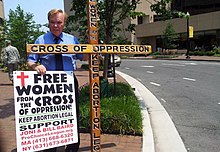Bill Baird | |
|---|---|
 Baird picketing National Right to Life Convention in June 2012 | |
| Born | June 20, 1932 |
| Occupation(s) | Reproductive rights advocate, speaker, social reformer |
| Awards | Humanist Pioneer Award |
Bill Baird (born June 20, 1932) is a reproductive rights pioneer, called by some media the "father" of the birth control and abortion-rights movement.[1][2][3] He was jailed eight times in five states in the 1960s for lecturing on abortion and birth control.[4] Baird is believed to be the first and only non-lawyer in American history with three Supreme Court victories.[4]
In 1967, hundreds of students at Boston University petitioned Baird to challenge a Massachusetts law that prohibited providing contraception to unmarried persons. On April 6, 1967, he gave a lecture at Boston University, during which he gave a condom and a package of over-the-counter contraceptive foam to a female college student. He was immediately arrested and eventually jailed. His appeal of his conviction culminated in the 1972 Supreme Court decision Eisenstadt v. Baird, which established the right of unmarried persons to possess contraception on the same basis as married couples.[5] U.S. Supreme Court Justice William J. Brennan, Jr. wrote in that decision: "If the right of privacy means anything, it is the right of the individual to be free from unwarranted governmental intrusion into matters so fundamentally affecting a person as to whether to bear or beget a child."[6] Eisenstadt v. Baird has been described as "among the most influential in the United States during the entire century by any manner or means of measurement".[7]
- ^ Barbara J. Love and Nancy F. Cott, Feminists Who Changed America, 1963–1975
- ^ "'Father' of Birth Control, Abortion Movement Sadly Faces Another Jail Term", Boston (UPI), March 19, 1973
- ^ "The Fiery Father of the Abortion Movement", The Examiner, June 25, 1980.
- ^ a b Love and Cott, Feminists Who Changed America
- ^ Matt (22 March 2012). "The Short History of Our Right to Contraceptives: Eisenstadt v. Baird 40 Years Later". Planned Parenthood Advocates of Arizona Blog. Retrieved 9 May 2013.
- ^ "Eisenstadt v. Baird, 405 U.S. 438 (1972)". FindLaw. Archived from the original on August 23, 2012. Retrieved August 5, 2012.
- ^ Lucas, Roy (Fall 2003). "New Historical Insight on the Curious Case of Baird v. Eisenstadt". Roger Williams University Law Review. IX (1): 48.